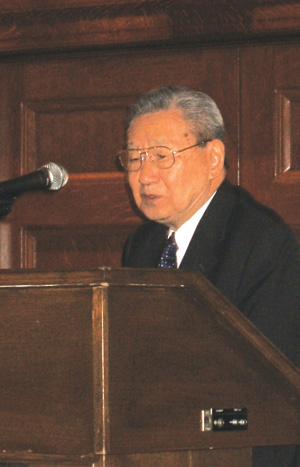
TheInternational Law Association and The Advocates' Society kick-started thecountdown to the association's upcoming conference with a special address fromJudge Shi Jiuyong, president of the International Court of Justice (ICJ).
 Shi's
lecture, held in Convocation Hall at Osgoode Hall late last month, was a
discussion of ICJ processes and the role it plays in the peaceful settlement of
international disputes.
Shi's
lecture, held in Convocation Hall at Osgoode Hall late last month, was a
discussion of ICJ processes and the role it plays in the peaceful settlement of
international disputes.
"We
have had many distinguished visitors in this historic hall but none more so
than our visitor today," said litigator Earl Cherniak, moderator of the event.
Shi
said he was "truly grateful for the opportunity" to speak in
"
He
pointed to the formation and promotion of the International Criminal Court as
an example of
Born
in
The
ICJ was formed in 1946 as the principal judicial organ of the
United Nations. Its seat is at the
"This
is especially true of today's court," said Shi. "Court members come from
The
members of the court do not represent their governments, but sit as independent
magistrates. Each must possess the qualifications required in their respective
country for appointment to the highest judicial office, or be jurists of
recognized competence in international law.
Shi
explained the dual role of the ICJ. It settles "contentious cases" in
accordance with international law. These are legal disputes submitted by
states. The court is also asked to give advisory opinions on legal
questions referred to it by duly authorized international organs and agencies.
These are known as advisory cases.
Shi
said the court's broad jurisdiction and dual role in contentious and advisory
cases is what differentiates it from other international tribunals.
"It
is very interesting to note the relationship that exists between the court and
the Security Council," he said. "The Security Council can recommend the states
submit their disputes to the court. The Security Council may take appropriate
measures to ensure compliance with the decisions of the court."
Shi
said it is true in the past that the ICJ has been criticized for the length of
time it takes to decide cases. Generally, it only decides one to three
contentious cases a year.
"That
criticism is not justified in my opinion," said Shi. These proceedings take
time because of the procedures and various jurisdictions involved, he said. "In
recent years, the court has taken a full review of its operations and as a
result has introduced mechanisms to enhance its internal functions."
The
72nd biennial conference of the International Law Association will be held in
Barry
Leon, co-chair of the event, stated that he is looking forward to hosting the
spring conference. "It really is a special opportunity for us to participate in
these types of programs right here in
Linda
Rothstein, president of The Advocates' Society, agreed and added, "The
Advocates' Society is delighted and honoured to have had a hand in planning
this very special program."
For
more information on the conference, visit www.ila2006.org.